the know all: Philosophy
The Know All: Philosophy
Pre-Socratic Philosophers
Thales of Miletus (c. 624/623 – c. 548/545 BC)

- Recognized by most (especially Aristotle) as the first philosopher in Greek / Western Tradition
- The founder of the Ionian School
- The Greeks thot they could explain the origin and nature of the world through myths of anthropomorphic gods and heroes. Phenomena like lightning and earthquakes were attributed to actions of the gods.
- By contrast, Thales attempted to find naturalistic explanations of the world, without reference to the supernatural. He explained earthquakes by imagining that the Earth floats on water, and that earthquakes occur when the Earth is rocked by waves.
- His hypothesis (explained by Aristotle in his book Metaphysics) is that the originating principle of nature and the nature of all matter was a single material substance: water. (OG Waterbender)
- Thought the Earth must be a flat disk which is floating in an expanse of water
- Cool to think that when we look for life on other planets we look for water
- Believed to do the first mathematical proof: The sum of angles in a triangle is always equal to 180° and that If the line that forms from the points AC is the diameter of a circle, than any point B will form a right angle
Anaximander (c. 610 – c. 546 BC)

- The successor to Thales as the “master” aka principle of the Ionian school
- His hypothesis is that the originating principle of nature and the nature of all matter was a single material substance: apeiron, or the infinite/boundless/ indefinite (OG Void/Heaven/Sky/Not-of-this-World bender)
- “it is neither water nor any other of the so-called elements, but a substance different from them which is infinite” [apeiron, or ἄπειρον] “from which arise all the heavens and the worlds within them.” —Phys, Op. fr. 2 (Dox. p. 476 ; R. P. 16).
- This word apeiron has served as inspiration for many religions to come
- Belief Earth floats free without falling and does not need to be resting on something
- Indicated by many as the first cosmological revolution and the starting point of (cosmic) scientific thinking - thought the earth was a cylinder
- The Sun is 27 units away, the moon is 18 and the stars are 9
- Theory on evolution: from warmed up water and earth emerged either fish or entirely fishlike animals. Inside these animals, men took form and embryos were held prisoners until puberty; only then, after these animals burst open, could men and women come out, now able to feed themselves
- Likely inspiration for all fish & man myths (jonah and the whale, mermaids, the shape of water, etc)
- The third successor of the Ionian school, Anaximenes, was the OG Airbender
Pythagoras (c. 570 – c. 495 BC)
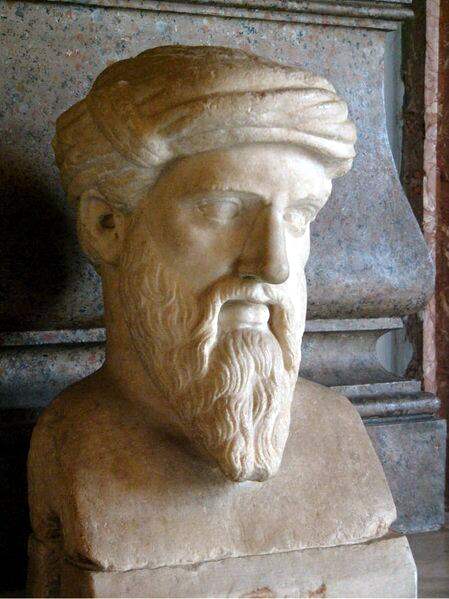
- Founded the idea of Metempsychosis, or the “transmigration of souls”, which holds that every soul is immortal and, upon death, enters into a new body
- According to Aristotle, the Pythagoreans used mathematics for solely mystical reasons, devoid of practical application. People thought there was more to life than numbers so no one wanted to hear him.
- He believed that all things were made of numbers. (OG Numberbender)
Pythagorean Number System:
- The number ONE: (the monad) represented the origin of all things
- The number TWO: (the dyad) represented matter
- The number THREE: an “ideal number” because it had a beginning, middle, and end (and was the smallest number of points that could be used to define a 2D triangle, aka the symbol of the god Apollo)
- The number FOUR: signifies the four seasons and the four elements.
- The number SEVEN: was also sacred because it was the number of planets, Apollo’s birthday was celebrated on the seventh day of each month, and the number of strings on a lyre which is the instrument used by Apollo & P’s ppl.
- The number TEN: was regarded as the “perfect number” and the Pythagoreans honored it by never gathering in groups larger than ten.
- They believed that odd numbers were masculine, and that even numbers were feminine
Other Pythagorean Beliefs:
- Anything triangle related gave him a hard-on. Especially the Tetractys which is a big triangle made from a row of 4, 3, 2, & 1 triangles. (refer to numbers above)
- Pythagorean theorem: a² + b² = c²
- The musica universalis (literally universal music) or The Music of the Spheres is basically the idea that stemming to the maths he discovered, all the sphere objects in the universe (sun, moons, planets, etc) can make a noise inaudible to the human ear, but sing nonetheless.
- Pythagoras first identified that the pitch of a musical note is in inverse proportion to the length of the string that produces it, and that the intervals between harmonious sound frequencies form simple numerical ratios (number wheel)
- 7 planets (at the time), 7 was the number of Apollo, 7 muses, 7 strings, etc.
- Believed to be the OG vegetarian
Heraclitus (c. 535 – c. 475 BCE)

- Co-founded ontology with Parmenides, aka the study of being
- Usually called the “Weeping Philosopher” bc he’s a sad boi and cries
- “Everything Flows” (πάντα ῥεῖ panta rhei) is his main motto
- Put by Plato in Cratylus, it basically means “All entities move and nothing remains still”; there is an ever present change
- “No man ever steps in the same river twice” or “We both step and do not step in the same rivers. We are and are not.”
- Schrödinger’s cat, To be or not to be
- The philosophical Concept of Becoming
- Is the western equivalent of Buddhism’s “Impermanence”
- Coined the word Logos, which he defined as: the principle of order and knowledge
- Aristotle applied the term to refer to “reasoned discourse” or “the argument” in the field of rhetoric, and considered it one of the three modes of persuasion alongside ethos and pathos.
- The Stoics thought logos was the active reason or anima mundi pervading and animating the entire Universe
- Philo wrote that God created and governed the world through mediators. “Logos” is the chief among them, the next to God, demiurge of the world. Logos is immaterial, an adequate image of God, his shadow, his firstborn son (aka Jesus Christ).
- Thought fire was the primordial element from which everything was made (OG Firebender)
Parmenides (c. 515 – c. 4XX BC)

- Co-founded ontology with Heraclitus, aka the study of being
- But they were not buddies, rather rivals in this new school of thought
- He argues that “A is not” can never be thought or said truthfully, and thus despite appearances everything exists as one, giant, unchanging thing.
- Generally considered one of the first digressions into the philosophical Concept of Being
- Also known as B Theory, where past, present and future are equally real, and that time is tenseless. This would mean that temporal becoming is not an objective feature of reality
- Also known as The Void
- Seen as a response to Heraclitus’s Concept of Becoming bc Heraclitus references Pythagoras by name
- First created the concept of 3 geographical climates (since 1936 there are 5), labeled by Aristotle as:
- The “Torrid Zone” – the area near the equator that was too hot for habitation
- The “Frigid Zone” – from the Arctic Circle to the pole, permanently frozen
- The northern “Temperate Zone” – the only area believed to be habitable (the southern one not yet discovered)
Democritus (c. 460 – c. 370 BC)

- Basically, along with Leucippus and Epicurus (fellow masters/ students), he proposed the earliest attempt of the atomic theory.
- Unlike Aristotle or Plato, the atomists attempted to explain the world without reasoning as to purpose, prime mover, or final cause.
- Usually seen as the laughing philosopher, as opposed to heraclitus (the crying philosopher)
- Called the father of science for his rationalism, humanism, & love of freedom
The Ancient Greeks
Socrates (c. 470 – 399 BC)

- So influential of a philosopher that all before him was called Pre-Socratic
- Didn’t write anything, luckily two of his students (Plato & Xenophon) did, in the form of clever/humorous/quippy stories wherein Socrates & Plato/Xenophon would dialogue
- “I know that I know nothing” - Plato’s Apology, is a famous quote of his.
- Developed the Socratic Method: a form of cooperative argumentative debates between 2 ppl, based on asking and answering questions to stimulate critical thinking and to draw out ideas and underlying presuppositions/assumptions.
- As Plato puts it, it’s to “act as a midwife (maieutic)”; classic women.
- “The unexamined life is not worth living” is his famous response to his trial where he had to choose between exile (& never finding out why he was accused of corrupting the minds of the youth) or death. He chose death.
- He preferred to continue to seek the truth to the answer to his question, in the after-life, than live a life not identifying the answer on earth
- For Socrates, to be separated from elenchus (the truth) by exile was a fate worse than death. This was his ultimate purpose in life: devoting himself only to what he regards as the most important art or occupation, that of discussing philosophy
- In Xenophon’s accounts, Socrates denies accepting payment for teaching. More specifically, in the Apology, Socrates cites his poverty as proof that he is not a teacher.
- His last words were spoken to his wealthy friend: “Crito, we owe a rooster to Asclepius (God of medicine, son of Apollo). Please, don’t forget to pay the debt.”
Plato (c. 428 – c. 347 BC)

- Founder of The Academia (The first western “university”/institution of higher learning)
- Aimed to help people achieve “eudaimonia” or fulfillment
- Idea inspired by Sparta (incredible city for soldiers)
- Taught and led with the ideal role models: philosophers (called Guardians) instead of bad role moels: celebrities, athletes, etc. based on material values (wealth/fame/etc)
Plato’s Five Systems of Philosophy:
- Metaphysics: study of existence (what’s out there)
- Epistemology: study of knowledge (How do I know about it)
- Ethics: study of action (what should i do)
- Politics: study of force (what actions are permissible)
- Esthetics: study of art (what can life be like)
The Theory of Forms:
- There exists a world where ideas in their perfect form exist. Anything we create on earth is material and therefore imperfect because it is: 1) is subjectively unique and 2) the inherent nature that the material will decay/devolve is unlike the ideal idea.
- They believed that the stars and cosmic beauty was perfect.
- By knowing what we think is ideal, we can more clearly start to define what is wrong and what we need to do to make it better
- Materials < Beauty < Justice < Good (Virtuousness)
- The idea that when you die you go to this ideal world where everything is perfect serves as a strong influence on Christianity/Abrahamic religions (translated by Philo)
- Drawing from Pythagoras, Plato described astronomy and music as “twinned” studies of sensual recognition: astronomy for the eyes, music for the ears, and both requiring knowledge of numerical proportions
- True love is admiration – your perfect partner should be trying to seduce each other into becoming better versions of each other.
- We find things beautiful when we sense things we subconsciously need in our lives: gentleness, harmony, balance, peace, strength. These educate our soul on what we crave. Also important is ugliness; dangerous, disgust, anger & damaged characteristics.
Aristotle (c. 384 – c. 322 BC)

- Student to Plato, raised by a Guardian (from The Academia) after his father died at 13.
- Founder of the Lycellum, the rival school to Plato where he taught his students to have rational thought and follow the Laws of Logic.
- Syllogism: the combination of a general statement (the major premise) and a specific statement (the minor premise), a conclusion is deduced:
- All men are mortal ⇒ Socrates is a man ⇒ Socrates is mortal
Aristotle’s Three Classifications of Life Forms:
- Plants: are above minerals/ores can reproduce & grow
- Animals: with(out) blood ≈ (in)vertebrates; has 5 senses
- Humans: the (ir)rational ≈ im(material) mind; can think.
- If the mind were material, then there would have to be a corresponding thinking-organ. And since all the senses have their corresponding sense-organs, thinking would then be like sensing. But sensing can never be false (according to Aristotle), and therefore thinking could never be false. And this is of course untrue. Therefore, Aristotle concludes, the mind is immaterial.
- In return for teaching Alexander The Great in 347 BC, Philip II agreed to rebuild Aristotle’s hometown of Stageira, which Philip had destroyed, and to repopulate it by buying and freeing the ex-citizens who were slaves. This was shortly after Plato’s death.
- Alexander collected plants & animals in his conquests for Aristotle’s research, allowing Aristotle to develop the first zoo and botanical garden in existence.
- The derivation of everything ‘logical’ (cars, tech., toilets, legos, etc) comes from his laws
- Was largely ignored in his time, and ultimately exiled. He died 1 month later.
The Stoics
Zeno of Citium (c. 334 – c. 262 BC)
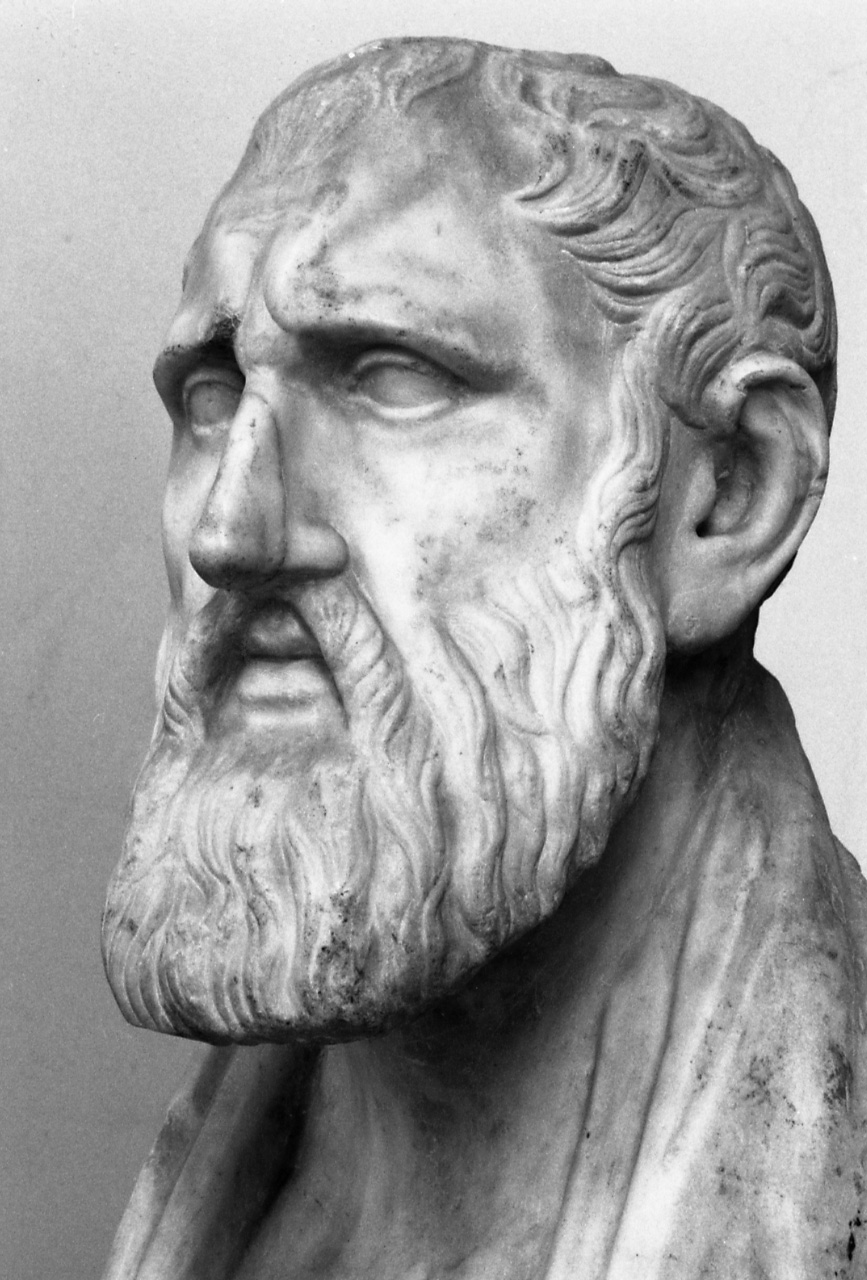
- Founder of Stoicism, a lifestyle for every Roman peasant to Emperors for 400+ years.
- Unlike the other schools, Zeno chose to teach his philosophy in public spaces
- Stoicism teaches how to control ur emotions rather than let them destroy you
- Nothing should surprise you. Expect betrayal/greed & it won’t hurt you.
The Four Cardinal Virtues (aretai) of Stoic Philosophy:
(A classification derived from the teachings of Plato - Republic IV. 426–435)
1. Wisdom (σοφία “sophia”)
2. Courage (ανδρεία “andreia”)
3. Justice (δικαιοσύνη “dikaiosyne”)
4. Temperance (σωφροσύνη “sophrosyne”)
Seneca (c. 4 BC – AD 65)

- Tutor to Nero, an infamously tyrannous roman emporer who slept with and killed his mom, raped little boys, and eventually forced Nero to commit suicide in front of his family.
- When Seneca’s wife was weepingly clinging to him, pleading him to stop, he turned with a weary smile and simply said: “What need is there to weep over parts of life? The whole of it call for tears.”
- Hated the idea of hope as an emotion. “Hope must be stumped out conclusively for one to achieve inner peace”. This is because hope only lifts you up higher for the eventual, and inevitable fall.
- Instead, live everyday as the worst, & nothing bad will bring u further down
Marcus Aurelius (8 March 161 – 17 March 180)

- The last of the rulers traditionally known as the Five Good Emperors/Pax Romana, an age of relative peace and stability for the Roman Empire
- Stoics taught that sex is just within marriage, for unitive and procreative purposes only. Still followed by the Catholic Church to this day.
- Stoics commonly employ ‘The View from Above’, to gain a ‘bigger picture’
- “Say to yourself in the early morning: I shall meet today ungrateful, violent, treacherous, envious, uncharitable men. All of the ignorance of real good and ill… I can neither be harmed by any of them, for no man will involve me in wrong, nor can I be angry with my kinsman or hate him; for we have come into the world to work together” - Marcus Aurelius Meditations
- The Stoics believed that the Universe was material, rational & reasoning, unlike Aristotle.
- Criticism by the richest man in the eastern hemisphere: “these disciplines of the cult of the unemotional, who want to be considered calm, brave, and steadfast because they show neither desire nor grief, neither anger nor pleasure, cut out the more active emotions of the spirit and grow old in a sluggish, enervated life.” –Herodes Atticus
The Dark Age
Saint Augustine (13 November 354 – 28 August 430 AD)

- Essentially translated and integrated Plato’s work into present day anthropology with Christian values and ideologies. (Philo translated Plato 300 years earlier for the Jews)
- Born in the age of the 1st Roman Emperor who converted to Christianity: Constantinople
- He believed Christians should let the Jews “survive but not thrive”, as God wanted the dispersion (aka exile) of Jews to be a warning for Christians.
- Typically painted in his study (by Botticelli, Peter Paul Reubens, etc)
- Just War Theory: while individuals should not resort immediately to violence, God has given the sword to government for good reason
- Basically: if govmt says it’s ok, then u didn’t “Thou shalt not kill”
- Believed the body was a 3-dimensional object made of the four elements, wherein the soul has no spatial dimensions, it just exists to rule the body.
Augustine’s Refutations:
- Humans can be perfected (by self-help): impossible because our ego’s pride and need for dominance (Libindo Dominande) will never allow for it. The mentality that cause the ‘Original Sin’ (coined by Augustine) of Adam & Eve is still prevalent in all of us.
- Pride of ‘divinely chosen’ roman emperors: sinful. City of Men vs City of God
- Plato’s work of faith in the ideal (at this point called heaven) was much more widespread that the cold logic of Aristotle. This faith over reason inspired a lot of illogical and religiously inspired wars. For example, “Deus Vult” (God wills it) was the famous Catholic catchphrase of the Crusades in 1096-1130 AD. Events like these, ironically, turned them back into the dark cave they believed they came out from.
Saint Thomas Aquinas (c. 1225 – 7 March 1274)
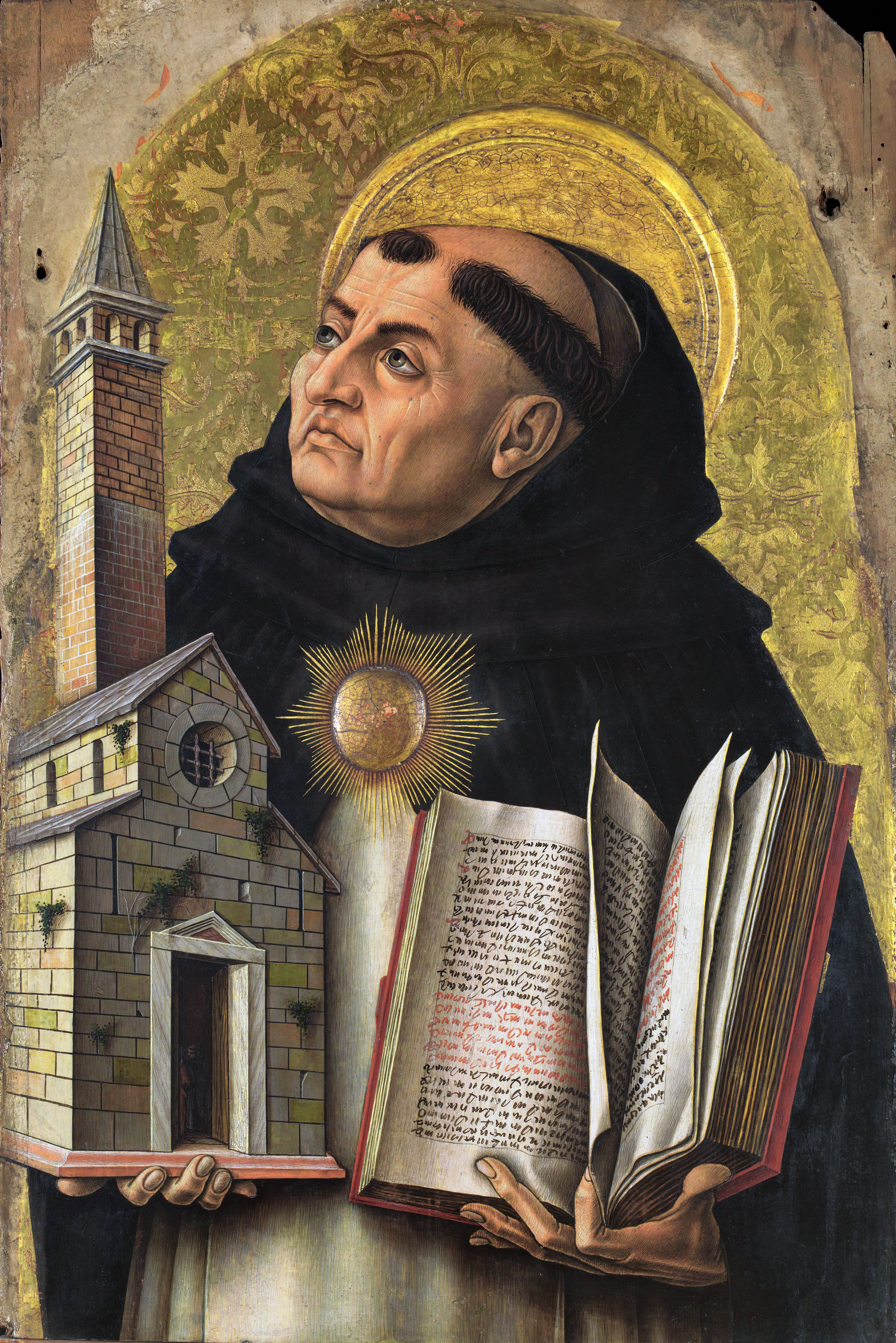
- Essentially translated and integrated Aristotle’s work into present day anthropology with Christian values and ideologies.
- Note that this was 900 years after Augustine.
- Aquinas learned from Maimonides (Jewish Philosopher) the works of Aristotle and the Islamic Golden Age (where faith + reason = philosophy)
- In early 9th centruy Al-Ma’Mun brought Aristotle to Islam, science, alchemy, algebra, etc flourished.
- Greek philosophy was heavily criticized and rejected by Al-Ghazali in Tahāfut al-Falāsifa (“Incoherence of the Philosophers”).
- Averroes rebutted, but it was too late. Islam hasnt recovered since.
- Maimonides found that God never messed with the laws of Nature
- Collected and modernized accepted ideas from every corner of the globe from all points in time, even before the time of Christ to determine how philosophers were so intelligent before even knowing God existed. He believed good ideas can come from any person with any background, creed or religion (an idea held to this day).
- Natural law: feats accomplished by man without divine intervention
- Knowledge and intelligence can and should come from multiple sources: intuition, rationality, science, revelation, pagans, monks, etc. This seems obvious until we think about just how often civilization has been and is still being harmed by people’s refusal to accept this mentality.
- After his death he was turned into the Saint of Teaching by the Church
- If these three religions ever found common ground, it was by placing reason over faith.
- This love and acceptance of the beauty of humans to a logical and mathematical degree was celebrated by Renaissance painters (Raphael, Da Vinci, etc). Heaven could wait.
The Enlightenment/Scientific Revolution
Copernicus (19 February 1473 – 24 May 1543)
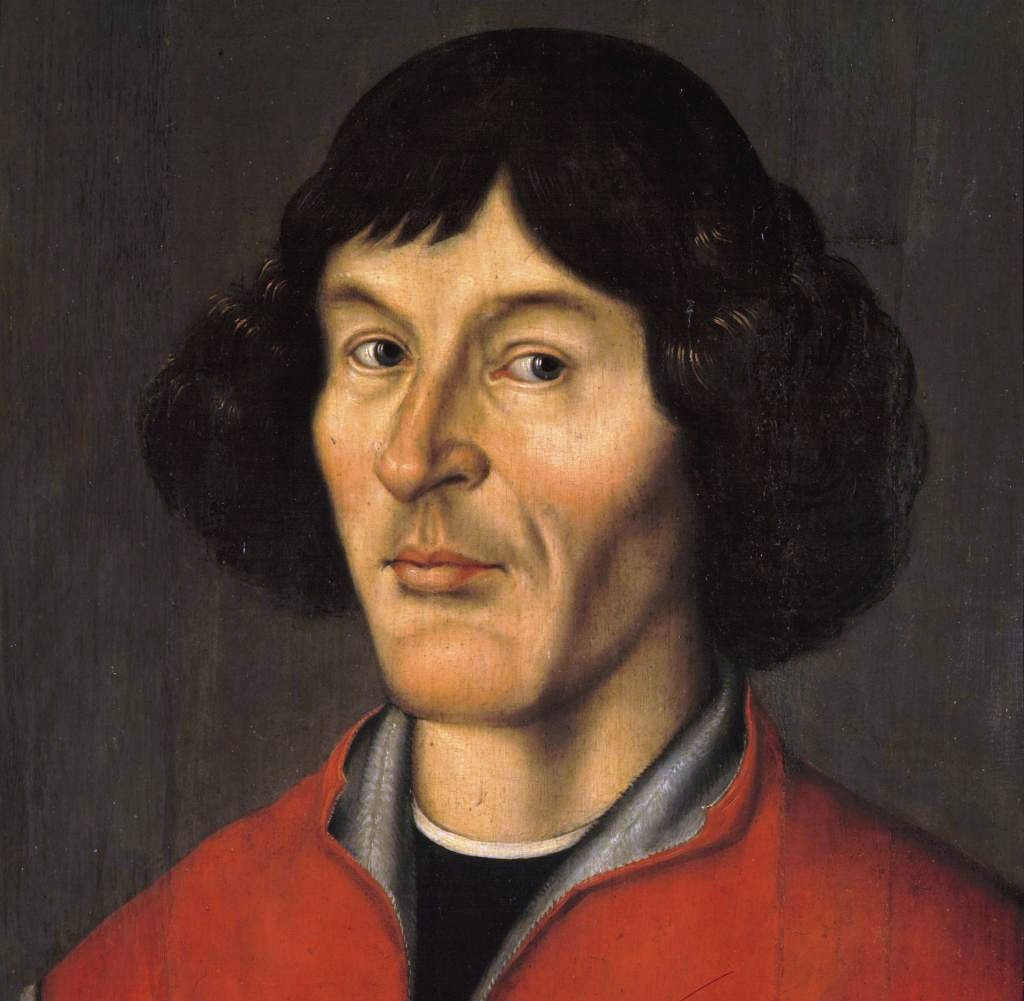
- Published a model of helio-centrism (the earth revolves around the sun)
- Goes against a verse in the bible that says God created earth as the center of life
- Goes against Aristotelian physics and cos
- Was ostracized for going against the Catholic Church
- Quantity theory of money: observed by the influx of silver and
- Money can lose its value through excessive abundance, if so much silver is coined as to heighten people’s demand for silver bullion. For in this way, the coinage’s estimation vanishes when it cannot buy as much silver as the money itself contains […]. The solution is to mint no more coinage until it recovers its par value.
Galileo (15 February 1564 – 8 January 1642)
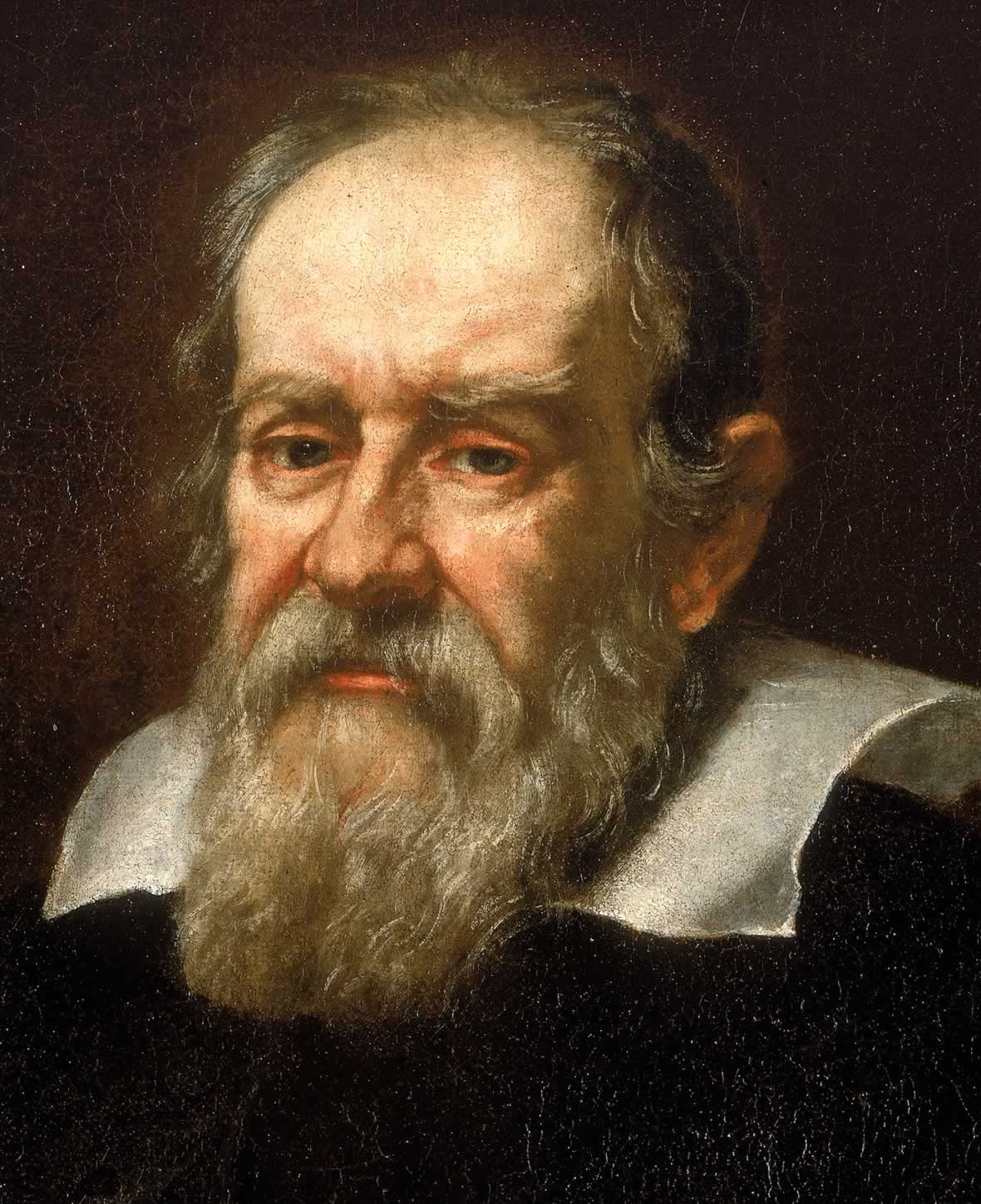
- According to Stephen Hawking, Galileo probably bears more of the responsibility for the birth of modern science than anybody else, and Albert Einstein called him the father of modern science
- Was the first dude to use a telescope, from 3x magnification to 8x to 30x.
- In 1633 Galileo Galilei was convicted of grave suspicion of heresy for “following the position of Copernicus”, and was placed under house arrest for the rest of his life
- Galileo observed and discussed Kepler’s supernova in 1604. Since these new stars displayed no detectable diurnal parallax, Galileo concluded that they were distant stars, and, therefore, disproved the Aristotelian belief in the immutability of the heavens
- In September 1610, Galileo observed that Venus exhibited a full set of phases similar to that of the Moon. This resulted in the great majority of astronomers converted to heliocentric planetary models.
- The categorisation of the four large moons of Jupiter discovered by Galileo (Io, Europa, Ganymede and Callisto) as the Galilean moons
Descartes (Rationalism) (31 March 1596 – 11 February 1650)

- Methodological doubt: to doubt everything. In the process of doubting, you can doubt the outside world, your senses, your body, but not your mind.
- You can dream that ur in another place, maybe scoring the winning goal in the world cup, digging your cleats in the grass. This indicates we can not trust our senses; we can see hallucinations or mirages.
- “Cogito Ergo Sum; I think therefore I am” - you know you exist, because you think. The world exists bc you can rationally think of it.
- He lied by saying that “God is innate” and “If God is perfect, He must be good.” and if God is good, surely He wouldn’t deceive me? Surely everything I can touch, see, feel etc is real and made in God’s image.
- Catholic Church: We might of been wrong earlier, but I guess we can try to understand God’s thinking further thru scientific method. Let’s stop the inquisition.
- Mind-Body dualism: How do the mind and body interact; what’s the driving force?
- The mind is the immaterial soul; the divine spark. If a sin is committed ⇒ priest
- The body is material; physical; mechanistic. If body is a sick ⇒ doctor/physicians
- The dude operated on live animals bc they rnt conscious: see my freshman interp paper
Social Contract Theorists/Empiricists
Locke, Hobbes, Rousseau

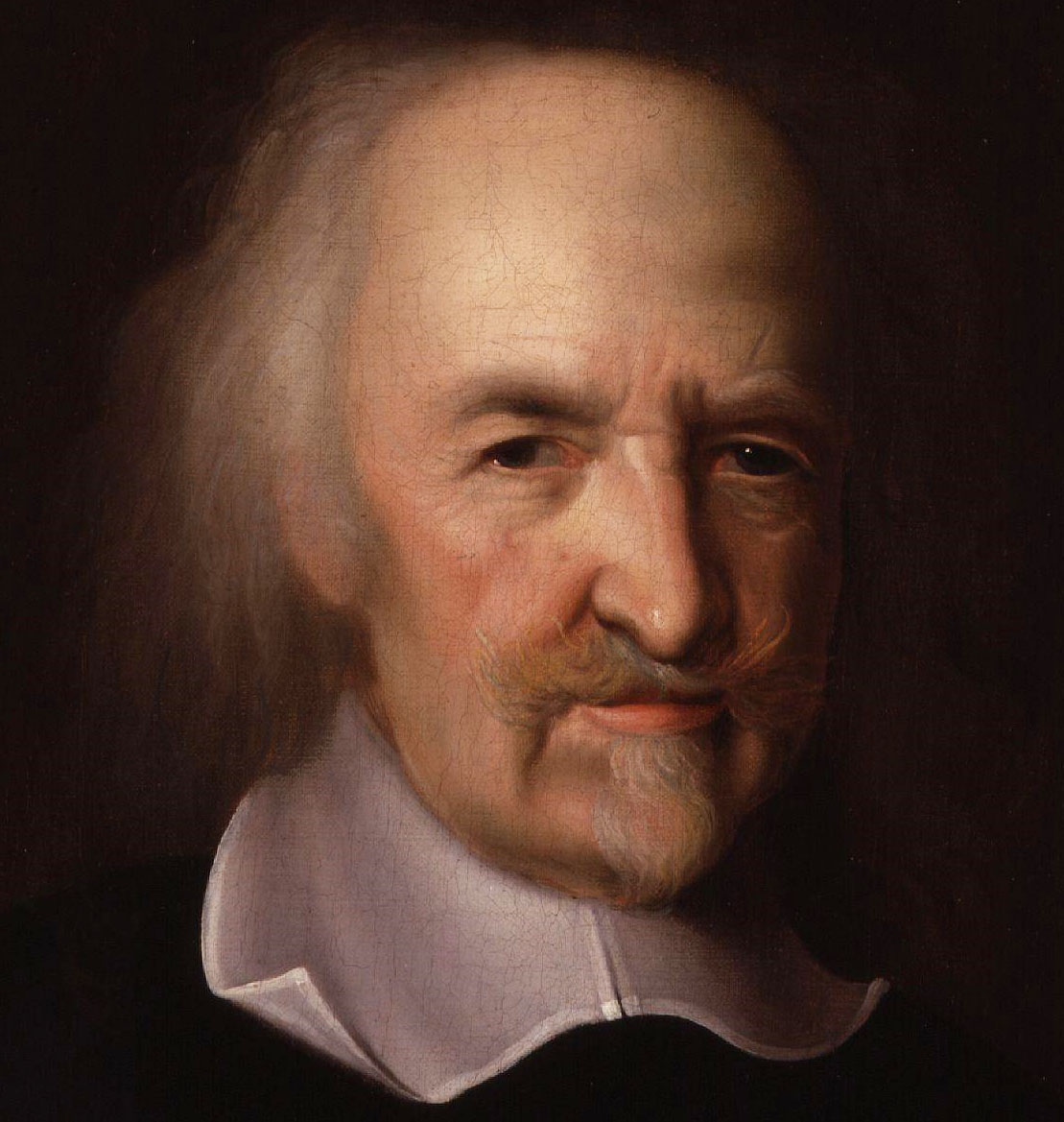
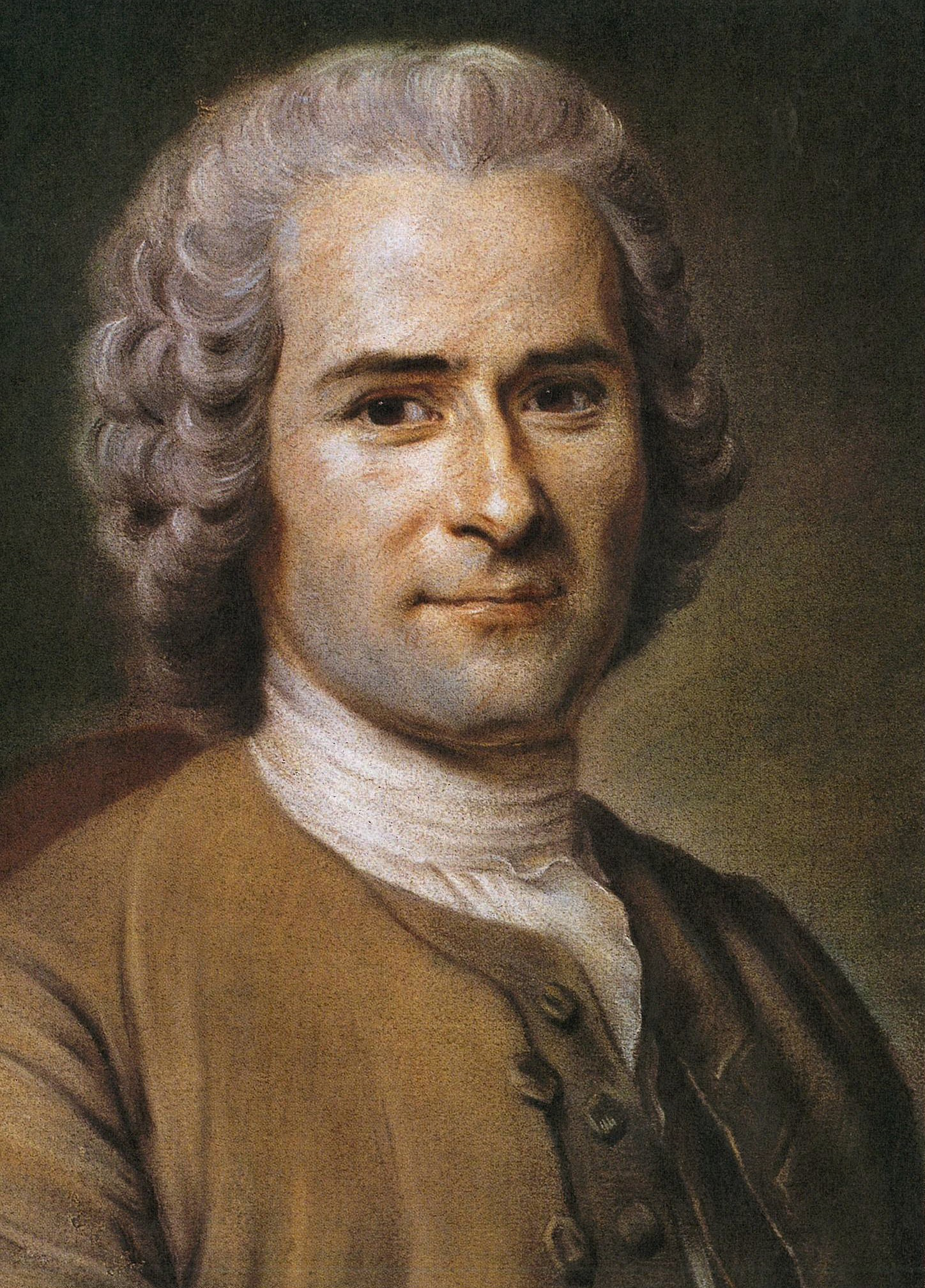
- The first to define the self through a continuity of consciousness. He postulated that, at birth, the mind was a blank slate or tabula rasa
- Knowledge is instead determined only by experience derived from sense perception. This is now known as empiricism.
- Derived from Plato’s Theatetus, (the mind is like a “wax tablet”)
- The ultimate aim of the state should be preserving the quiet and comfortable living of men in society. It should have nothing to do with the good of men’s souls. Religion was a personal choice, and churches were voluntary orgs that could (in turn) set their own rules and be left to it.
- After his Letter Concerning Toleration (1689) the idea of locking up someone in jail based purely on their beliefs fell completely out of favor
- In his second essay Two Treatises of Government (1689), he agreed with Hobbes that before government there existed the State of Nature. However, he disagreed that the world was a chaotic, barbaric stone age. We shouldn’t lower their expectations and submit to the government because it’s better than chaos, rather we voluntarily conceded some of our personal freedoms only in so far that it preserved our natural rights.
- Major influence for the Declaration of Independence: Separation of church and state; Right to bear arms (the means to overthrow the government), Freedom of Speech, Life, Liberty and the pursuit of Happiness
- We are all able to reason aren’t we, so maybe we should equal? we should all be at the center of politics. Challenge the idea of god gives power to the king/pope/people below.
- Maybe we’re not amazing bc we were put into the center of the universe by God, but because we can invent things, create rational thoughts, question stuff etc
The Trouble Makers / Empiricists
Kant
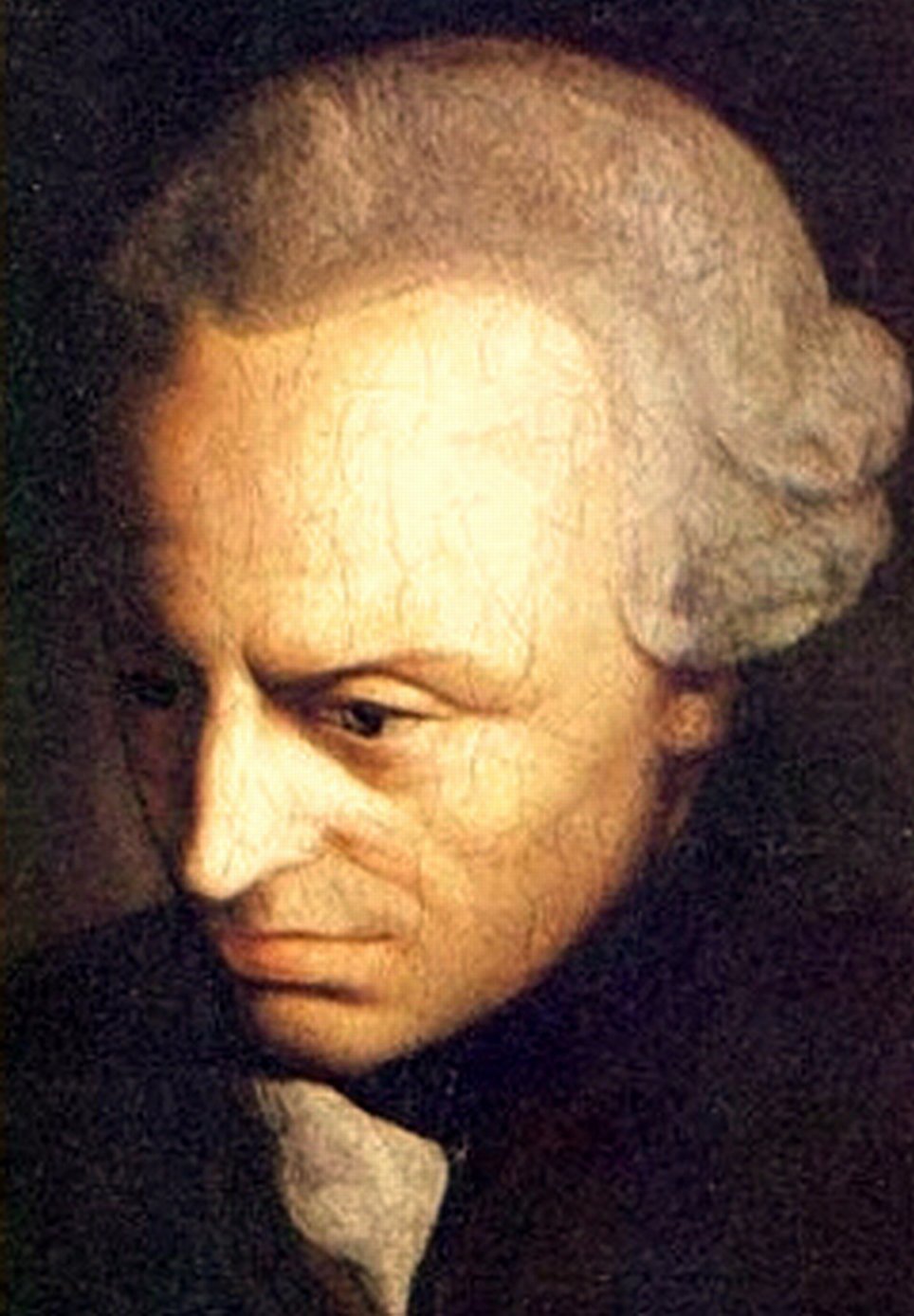
- Started asking questions pointing towards the post modern era
- A lot of what we know is just from a human point of view
- We can’t access reality as it really is
Darwin

- Man’s amazing yes, but man is just an animal.. evolved a bit sure, but just a couple monkeys devoloped further
Marx

- Most of you are exploited, you are all products you live in.
- Most societies are messed up, too
- You think you’re free but you’re actually doing the will of the upper classes. You’re not free you’re completely predetermined by history, family etc
- Karl Marx modified it by arguing that the labor theory of value requires that prices, under equilibrium conditions, are determined by socially necessary labor time needed to produce the commodity and that quantity of money was a function of the quantity of commodities, the prices of commodities, and the velocity.[14] Marx did not reject the basic concept of the Quantity Theory of Money, but rejected the notion that each of the four elements were equal, and instead argued that the quantity of commodities and the price of commodities are the determinative elements and that the volume of money follows from them. He argued…
- The law, that the quantity of the circulating medium is determined by the sum of the prices of the commodities circulating, and the average velocity of currency may also be stated as follows: given the sum of the values of commodities, and the average rapidity of their metamorphoses, the quantity of precious metal current as money depends on the value of that precious metal. The erroneous opinion that it is, on the contrary, prices that are determined by the quantity of the circulating medium, and that the latter depends on the quantity of the precious metals in a country;this opinion was based by those who first held it, on the absurd hypothesis that commodities are without a price, and money without a value, when they first enter into circulation, and that, once in the circulation, an aliquot part of the medley of commodities is exchanged for an aliquot part of the heap of precious metals.
Nietzsche

- “God is Dead”
- There’s no absolute value, no absolute morality
Freud

- Not only is man an animal, or have no free will, or have a bad set of values
- What we think of ourselves is not really real
- We have a whole subconscious that we can’t even comprehend. We don’t make any decisions for ourselves.
Modern Philosophers
WIP